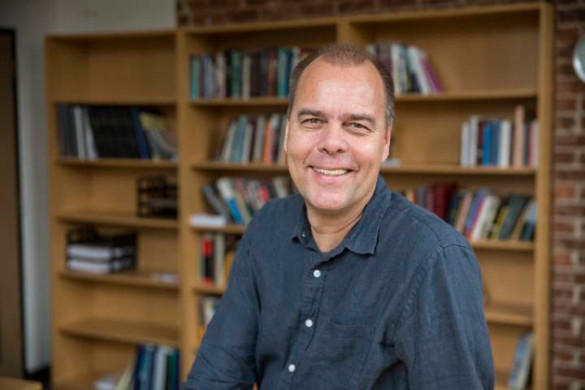
Cultural history, literature, film, media, political culture and thought are among the interdisciplinary areas that faculty and students will explore in the newly named Department of German, Russian and East European Studies.
”The department’s former name, Germanic and Slavic Languages, did not capture the range of expertise of our superb faculty or represent the diversity of courses available to our students,” said Lauren Benton, dean of the College of Arts and Science and the Nelson O. Tyrone Jr. Professor of History. “[rquote]The new name reflects the department’s international leadership in the study of cultural change in a vast and enormously important world region spanning Russia, Eastern Europe and Germany.”[/rquote]
“The past three decades have witnessed a radical expansion of the materials studied and the methodologies used by scholars in German,” according to Lutz Koepnick, the Gertrude Conaway Vanderbilt Professor of German Studies and professor of cinema and media arts. He is also department chair. “While language and literature studies remain a critical component of our curriculum, we now have faculty and students who also work on film, music, media art, intellectual history and much more. Our objects of study are German-speaking cultures in general, and we no longer view language and literature as the only keys to understanding these cultures.”
He also said that traditional concepts such as “Germanic” and “Slavic” have become deeply problematic in times of multicultural openness and global connectivity. They fail to describe the diversity of these cultures and are confusing for students when exploring the curriculum’s offerings.
Koepnick pointed out that about 20 percent of Germany’s population today comprises people with migrant backgrounds, a majority of whom come from Turkey. One reason to expand the focus of the discipline has been to address the heterogeneity of European cultures in a globalizing world.
“[lquote]As a critical switchboard of Europe’s past and present, Germany is a country in which many languages are spoken,”[/lquote] Koepnick said. “It is the home of writers, filmmakers, artists and musicians with enormously different cultural backgrounds, so what we need to gain in-depth knowledge of German culture’s past, present and future is a whole variety of methodologies and disciplinary perspectives.”
Koepnick looks forward to greater collaboration between faculty across campus. By renaming itself, the department aspires to become a dynamic hub for scholars from various Vanderbilt departments dedicated to German, East European and Russian studies, including art history, cinema and media arts, history, Jewish studies, music, political science and philosophy.
In the past, the relationship between the department’s “Germanic” and “Slavic” sides was relatively loose and undefined. According to Koepnick, the renaming of the department is also meant to signal efforts to achieve greater conceptual and scholarly unity within the department. The recent hire of Emily Greble, a leading historian of Eastern Europe, is an important first step to accomplish this goal. Greble will hold a joint appointment in the Department of German, Russian and East European Studies and the Department of History, and her research interests include the history of Islam in Europe, the transition from empire to nation-state in the Balkans, the histories of civil conflict and migration, and the history and aftermath of socialism.
”Greble is a trained historian, and her hiring is an excellent example of how we have moved beyond defining the department’s mission exclusively in terms of language and literature studies,” Koepnick said. “With Emily on board, we can also start to build new bridges between German studies and East European studies within the department and thereby add new aspects to the many things the department already contributes to Vanderbilt.“